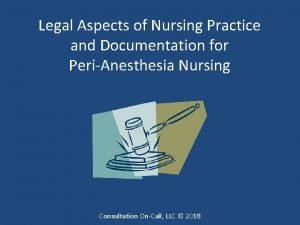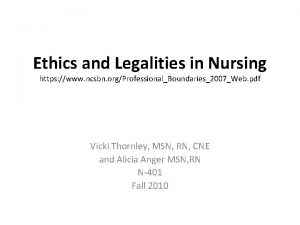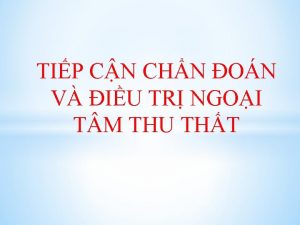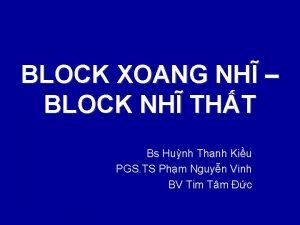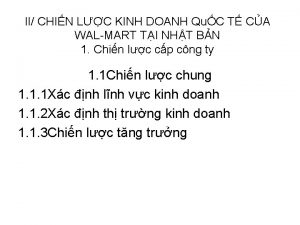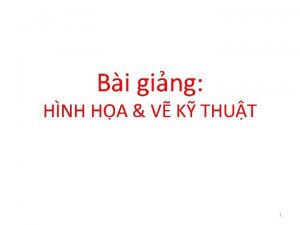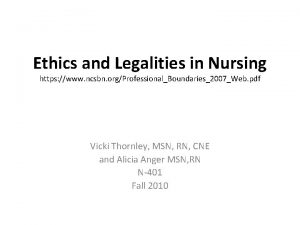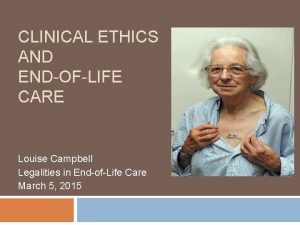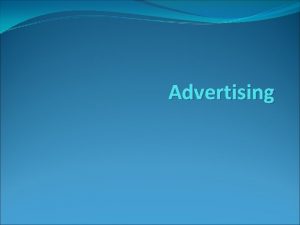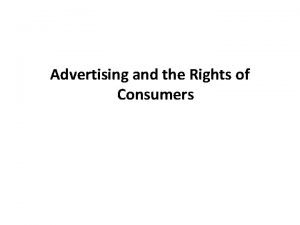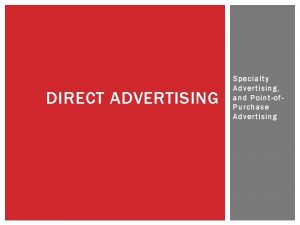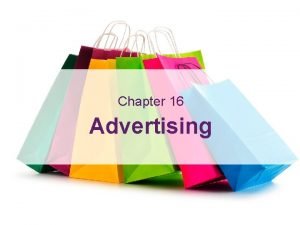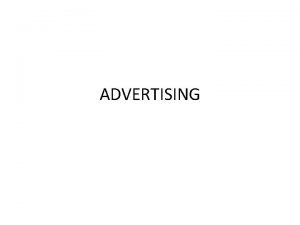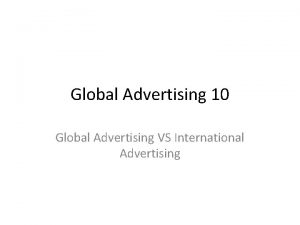Legalities and Ethics in Advertising Now that you












- Slides: 12

Legalities and Ethics in Advertising Now that you know how to influence the public through advertising, what will you do with that power? SOURCE: http: //www. poznaklaw. com/articles/falsead. htm POZNAK LAW FIRM LTD.

Two Conflicting Forces in the Constitution w First Amendment: Freedom of Speech grants us the right of free speech, protects all forms of communication, including advertising (referred to by lawyers as "commercial speech"). w Power to Regulate Commerce - Federal government has the power to regulate interstate commerce (via the Constitution). - Most state constitutions grant the State the power to regulate commerce conducted solely within the state. - In addition, Congress enacted the Federal Trade Commission (FTC) Act, which states that false advertising is a form of unfair and deceptive commerce (and allows the FTC to enforce laws regarding advertising), and the Lanham Act, which allows private parties to bring law suits against advertisers.

FTC Has Broad Authority to Regulate Advertising w “False Advertising” includes: w 1) Advertisements that are in fact untrue. Example: Listerine used to claim it was a remedy for colds and sore throats. Not true. Example: Crestor saying the FDA has determined that the medication poses no safety concerns. w 2) advertisements that make representations that the advertiser has no reasonable basis to believe, even if the representations turn out to be true (therefore, research must be on hand to support any claims). Example: If you say a breast enhancement pill will increase most women’s breast size by two cups, and you have no research to support that, then you are generating “false advertising, ” even if the statement is TRUE. w 3) advertisements that are misleading even if they are true. Example: An Anacin ad implied that Anacin was more effective than aspirin, when in fact, Anacin is aspirin. The statement it made was true, but the implication was misleading.

FTC Has the Power to: w Bar advertising (e. g. , many breast enhancement / penis enlargement products). w Order corrective ads (e. g. , Phillip Morris) w Order a "fencing in. " This enables the FTC to bar misleading ads with respect to a particular product and across all of a business's other unrelated product lines. For example, if product A is being promoted by false advertisement, products B and C might also be perceived as beneficial by association and therefore ads for B and C can be barred as well.

Lanham Act To establish a violation under the Lanham Act, consumers and competitors must prove the following: w w w (1) the advertiser made false statements of fact about its product; (2) the false advertisements actually deceived or had the capacity to deceive a substantial segment of the target population; (3) the deception was material; (4) the falsely advertised product was sold in interstate commerce; and (5) the party bringing the lawsuit (known as the "plaintiff") was injured as a result of the deception. w NOTE: Actual loss is not required to show an injury. All that is needed is a reasonable basis for the belief that the plaintiff is likely to be damaged as a result of the advertising. w Competitors keep a sharp eye out for “false advertising” because it’s an easy way to knock out their competition. As a result, the advertising field has a high degree of self-regulation.

State Statutes In addition to the FTC Act and the Lanham Act, which are federal statutes, most states, including Illinois, also have laws proscribing false advertising. Illinois is one of many states that has enacted the Uniform Deceptive Trade Practices Act. Under the Act, a "deceptive trade practice" includes the following: w Palming off occurs when an advertiser creates the impression that its goods or services are those that are furnished by a competitor. Example: you set up a hamburger stand that looked like a Mc. Donalds restaurant. w Misrepresentation occurs when an advertiser makes false or misleading claims about its goods or services, as under the FTC Act and the Lanham Act. w Product disparagement occurs when an advertiser intentionally makes false or misleading negative remarks about competing goods or services, causing its competitor to lose sales. w Bait-and-switch advertising occurs when the advertised goods or services are withdrawn from the market and substitute goods or services are instead offered for sale.

How Can You Protect Yourself Legally? If you are in the business of preparing marketing or advertising campaigns, you might want to get your client to guarantee that the information he or she provides is true, so that you will not be liable for information the client provides you.

Standard Agency Practices w Agency’s Job is to Get Info From the Client Agencies are generally not interested in manufacturing untruthful or even misleading information. It’s too risky. And clients are not usually interested in putting themselves at risk by publicly making false claims. (Of course, there always exceptions. ) An adept creative team can easily sell products without resorting to law-breaking. Otherwise, they won’t be in business long. w Agencies Usually Limit Their Client Lists - They usually avoid pornography, often avoid political advertising, and generally don’t want to be associated with businesses that will jeopardize their credibility with their other clients. - Agencies, like law firms, are ethically bound to not take on competing clients. Or, if even slight conflict of interest is possible, the agency will ask the clients involved if there will be a problem (example: Ogilvy and Mather represented both Volkswagen and Rolls Royce).

CASE STUDY: Breast Enhancement Claims Inflated, FTC Charges Promoters Must Pay $3 Million from Consumer. Affairs. com http: //consumeraffairs. com/news 03/wellquest. html July 10, 2003 Infomercial marketers Wellquest International, Inc. and Tony Hoffman Productions, Inc. have agreed to settle federal charges that they made false and unsubstantiated claims for three products - Bloussant, sold for breast enhancement; Ener. X, sold for men's virility, and D-Snore, sold to relieve snoring - in violation of the FTC Act. "Marketers must have rigorous scientific substantiation for the claims they make, " said Howard Beales, Director of the FTC's Bureau of Consumer Protection. "In this case, the claims were inflated, but the science just wasn't there. " According to the complaint, the defendants' ads state that Bloussant stimulates breast cells to regenerate the growth process, thereby increasing breast size by two cups in most women. The FTC alleges that these claims are unsubstantiated. Additionally, it alleges that the defendants falsely claimed that Bloussant is clinically proven to increase bust size in the majority of women, and is clinically proven to be safe. Bloussant was heavily marketed in magazines, such as Mademoiselle, Elle, and Allure, in monthly direct mailers, and through infomercials that ran on 30 major cable stations and numerous broadcast stations, as well as on the Internet. Consumers responding to these advertisements were directed to call a toll-free telephone number, where the telemarketers often reiterated the challenged claims. Bloussant cost $220 for a two-month supply and $574 for an eight-month supply.

CASE STUDY: Crestor Aztra. Zeneca, the maker of the cholesterol-lowering drug Crestor, has been accused of false advertising. According to the Food and Drug Administration (FDA), the drug company has printed misleading claims about Crestor's safety that state: A medication can be more effective and just as safe" -- this statement plays down the risks involved in taking a 40 mg dose of Crestor The FDA has confidence in the safety and efficacy of Crestor" -- this statement is not only misleading, but it suggest that the FDA does not feel the drug poses any safety concerns The drug company's faulty advertisement, which ran in national and regional publications, also quoted a statement that was "supposedly" taken directly from the FDA's Web site. The statement read: "The scientists at the FDA who are responsible for the approval and ongoing review of Crestor have publicly confirmed that Crestor is safe and effective, and that the concerns that have been raised have no medical or scientific basis. "

Legalities Aside, What About Your Personal Ethics? w This can be a tougher question. If it’s not illegal to manipulate people, use scare tactics, build desire for things many people can’t afford, make the public feel inferior if they’re not thin enough, not rich enough, etc. , where do you personally “draw the line”? w w w - What are you willing and unwilling to do in advertising? - How can you avoid putting yourself in compromising situations? - How might advertising skills be used in positive ways?

QUESTIONS?
 Unified products and services
Unified products and services Scbon
Scbon What is the difference between ethics and law
What is the difference between ethics and law Now i see it now you don't
Now i see it now you don't Ngoại tâm thu thất chùm đôi
Ngoại tâm thu thất chùm đôi Block nhĩ thất độ 2 mobitz 2
Block nhĩ thất độ 2 mobitz 2 Thơ thất ngôn tứ tuyệt đường luật
Thơ thất ngôn tứ tuyệt đường luật Thơ thất ngôn tứ tuyệt đường luật
Thơ thất ngôn tứ tuyệt đường luật Chiến lược kinh doanh quốc tế của walmart
Chiến lược kinh doanh quốc tế của walmart Tìm vết của mặt phẳng
Tìm vết của mặt phẳng Hãy nói thật ít để làm được nhiều
Hãy nói thật ít để làm được nhiều Tôn thất thuyết là ai
Tôn thất thuyết là ai Gây tê cơ vuông thắt lưng
Gây tê cơ vuông thắt lưng

